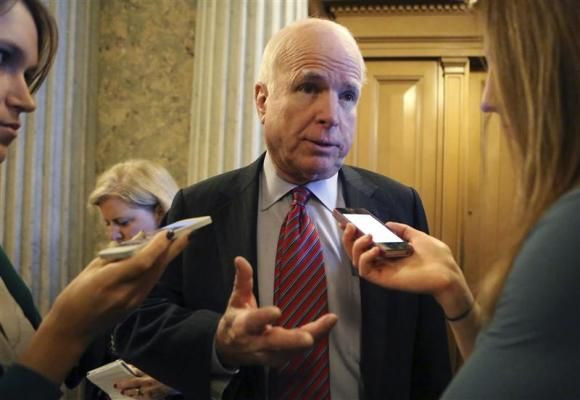At The Water's Edge: U.S. Foreign Policy In Ukraine Crisis Must Be Bipartisan

One sure sign that the political reality in the U.S. has really shifted dramatically is what has been happening at home since Russian troops began entering Ukraine’s Crimean peninsula. On Tuesday, Sen. Lindsey Graham (R-SC) took to Twitter to proclaim that Russia’s actions in the Ukraine are a result of President Barack Obama's administration’s failures in Benghazi, Libya. “It started with Benghazi,” he tweeted. “When you kill Americans and nobody pays a price, you invite this type of aggression.” Minutes later he added, “[Russian leader Vladimir] Putin basically came to the conclusion after Benghazi, Syria, Egypt -- everything Obama has been engaged in -- he's a weak indecisive leader.”
Graham’s tweets are not particularly surprising. Earlier he told CNN’s Candy Crowley that “every time the president goes on national television and threatens Putin — or anyone like Putin — everybody’s eyes roll, including mine. We have a weak and indecisive president that invites aggression.” Graham is not alone in his criticism. On Monday Sen. John McCain (R-Az.) told a pro-Israel group that Obama’s “feckless” foreign policy is responsible for the crisis in the Ukraine. Similarly, Rep. Mike Rogers (R-Mich.) told “Fox News Sunday,” that Russia is “playing chess” while “we are playing marbles.”
Regardless of whether you agree with Graham, McCain, and Rogers, what is striking about their comments is that they violate a long-standing tradition in American politics that politics ‘ends at the water’s edge.’ This sentiment, first articulated by Sen. Arthur Vandenberg (a Republican, also of Michigan) is worth reflecting on in its entirety: “‘bipartisan foreign policy’ means a mutual effort, under our indispensable two-party system, to unite our official voice at the water's edge so that America speaks with maximum authority against those who would divide and conquer us and the free world. It does not involve the remotest surrender of free debate in determining our position. On the contrary, frank cooperation and free debate are indispensable to ultimate unity. In a word, it simply seeks national security ahead of partisan advantage. Every foreign policy must be totally debated (and I think the record proves it has been) and the ‘loyal opposition’ is under special obligation to see that this occurs.”
Vandenberg doesn’t dispute the fact that in a democracy foreign policy should be considered and vigorously debated. What he does suggest is that these debates should ‘end at the water’s edge,’ particularly when the president is, as Obama is now, responding to fast-moving events abroad. Unfortunately, while this may have been conventional wisdom in Vandenberg’s time it is no longer the case. In our era of hyper-partisanship, Vandenberg’s maxim has become a thing of the past. Instead of supporting the president, legislators are second-guessing him vocally and publically. The urgency of events and rally-around-the-flag mentality that used to help insure America remain united in its foreign policy no longer holds sway. Instead, the bitter partisanship that has become a sad fact of our domestic policy life has now pervaded and potentially forever changed our foreign policy as well.
But what do we, as a nation, gain by having our representatives air their differences publically? Moreover, if Graham, McCain, and Rogers really have plausible alternative foreign policy recommendations why not tell the president privately? What benefit is it to anyone in the U.S. (except, potentially, themselves) to make the types of partisan statements they have? As opposed to basking in public pronouncements about the president’s ‘weakness,’ ‘duplicity,’ and ‘fecklessness’ – the nation would be far better served if these legislators shared their policy recommendations with the administration in private.
Vandenberg was right, “bipartisan foreign policy’ means a mutual effort… to unite our official voice at the water's edge so that America speaks with maximum authority against those who would divide and conquer us and the free world.” As focused on the mid-term and upcoming presidential elections as our legislators may be, they would be wise to reject the temptation to let their political interests get the better of their judgment.
Jeanne Zaino, PhD, is Professor of Political Science at Iona College.
© Copyright IBTimes 2024. All rights reserved.





















